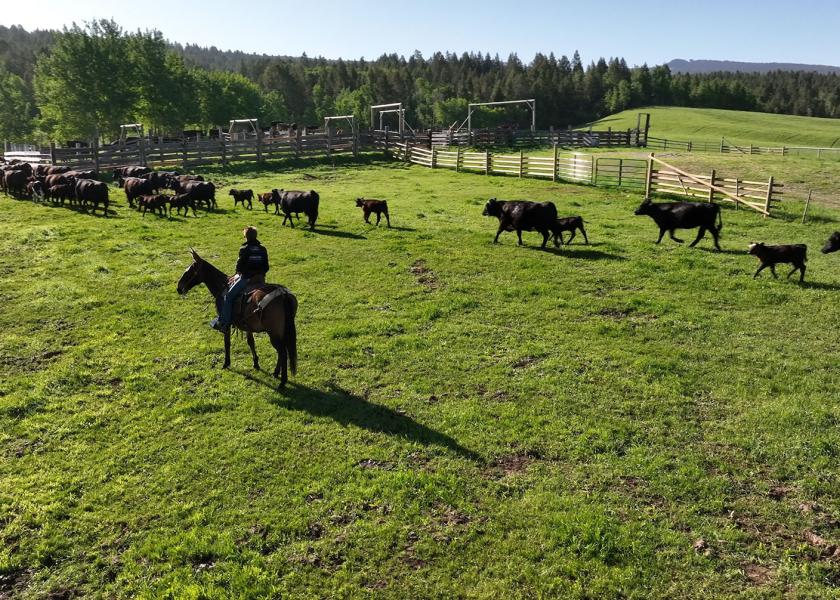Speer: Some More Most Important Things

Most Important Thing: Last week’s column, The Most Important Thing (which is really a lot of things), was largely about the psychology of markets, money, and our subsequent decision making. The discussion concluded with a recent comment from Dr. Ed Usset (University of Minnesota). He was asked about the importance of having a marketing plan going into 2024. He responded by noting, “Producers are bombarded with outlook – opinions on the market…And I tell people, try doing an in-look…”.
The column ran on New Year’s Day. As luck would have it, the same day, Damian Mason (The Business of Agriculture) released his recent podcast (“It’s Time To Simplify Your Grain Marketing”). Mason’s guest was Joe Vaclavik, Standard Grain (whom I’ve referenced in previous columns – here and here).
What does that have to do with cattle? Valclavik’s discussion extends far beyond just grain marketing. In line with the previous column, he highlighted some key principles worth covering here. Below is my recap of his observations along with my applicable notes.
Three Things To Do: Vaclavik discussed three things necessary for success. They are as follows:
- Determine your cost of production. The premise applies to corn, soybean, and wheat production – as well as calf operations and every other type of business.
- Understand crop insurance. Or LRPs – or understand and establish some meaningful (and simple) means of risk management.
- Understand cash sales. What’s the best alternative for me to market grain or the calf crop or stocker cattle?
Things NOT To Do: There was also some discussion about things NOT to do. This all gets a little more granular with the need for some additional color around each principle.
- Buy into the “price predictors people with strong opinions”. Vaclavik explained that, “Nobody has a damn clue where the market's going to go and if there's somebody who is telling you that they know where the market's going to go that person is an amateur. Professionals, when it comes to financial markets, deal more so in probabilities.”
- Given credence to the “crazy theories” the USDA is manipulating the market and/or out to get you. He explained it like this:
“USDA says that the corn yield is 173 and that's because they're trying to keep the prices down…We get more comments about this topic…than anything. It's the government's out to screw us. The USDA is out to screw us, everybody's out to screw us…It's not something everybody wants to hear but there is nobody that's out to get you. This is you versus you.”
Unfortunately, we often hear much of that same sentiment from some of the social media talkers – especially when it comes to the monthly cattle-on-feed report.
- Spend too much time on, or give too much credence to, social media:
“Most of it's poison: I mean you go and you scroll through Twitter and everything is sensationalized, everybody's got some smartass comment, everyone's got some crazy weather map with a lot of red on it, everyone's got a yield report that is an outlier from every other yield report to support their opinion of the marketplace.”
- Trade futures and/or options (see my column Don’t Try This At Home – it includes some comments from Vaclavik).
“A lot of guys trade the markets because it's fun or they want to speculate or they have an opinion. 99% of the US population has no business ever trading a futures or options contract unless they've got a physical position that needs to be hedged. First of all, it's stressful. You guys are stressed out enough, you don't need to add more stress. Second, the odds of making money trading futures over the course of time is not very good. Most people who trade, especially smaller traders, lose money. That’s the fact of the matter. You would be so much better off taking any extra cash that you have and either reinvesting into the business and build working capital, invest in some sort of off- the farm investment (buy an S&P 500 Index Fund) and sit on it till you die. …Trying to speculate in these markets is an additional stressor. It's not going to work for you financially over the course of time with [only] a few exceptions.
Ordinary Things: All of this discussion gets us back to where we started – less outlook, more in-look. That is, success comes from making sure we don’t get distracted by stuff that just doesn’t matter – and ensuring we stay focused on the stuff that does matter. I’m reminded of Keith Cunningham’s great observation in his book, The Road Less Stupid: “Ordinary things, consistently done, produce extraordinary results.”







